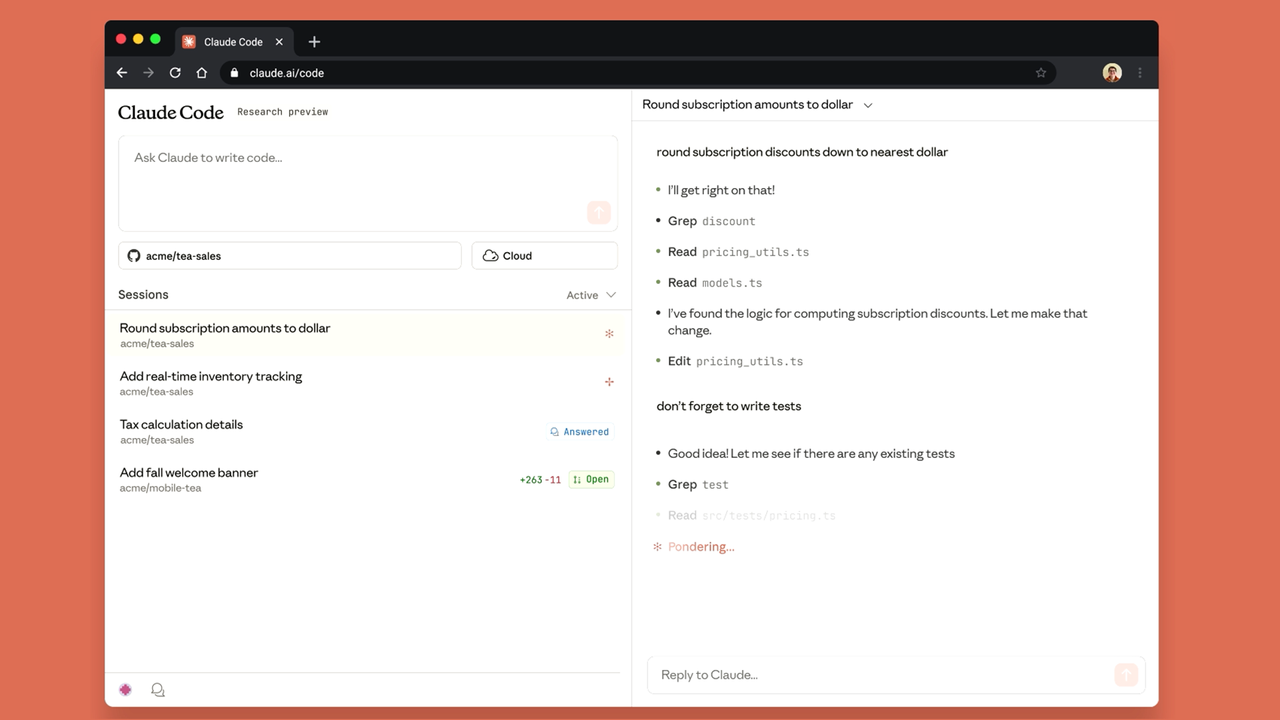
- Anthropic has made Claude Code easier to use for anyone, regardless of their technical background.
- Users can access Claude Code in a web browser or on a phone and assign multiple coding tasks, addressing them in real time.
- The tool’s new accessibility opens up advanced coding capabilities to independent creators and non-developers.
Anthropic is making its Claude Code programming tool available and usable by almost anyone with a web browser or smartphone.
No longer limited to terminals and local environments, you can now delegate multiple coding tasks to Claude Code right from your claude.ai browser tab.
Being usable on mobile devices enhances that feeling of flexibility. You can use Anthropic’s iOS app to access Claude Code and have new software defined in no time, although not without bugs and broken mechanics.
It’s a notable change for a tool like Claude Code, which Anthropic boasts of having used internally to write 90% of its own code. The company claims it has contributed to a 67% increase in production per engineer, even as the engineering team doubled in size.
This is partly because Claude Code is very proactive in receiving instructions. Users can submit new requests while previous ones are running, and modify them before finishing if it appears that Claude has misunderstood what he was asked to do.
In a sense, this is the latest chapter in AI’s ongoing effort to dissolve the barriers between expert tools and casual users.
In another, Claude Code on the web allows users to get programming software to mimic how humans work in disjointed fits and starts that jump to different contexts. You simply assign the work, Claude does the execution, and you review the results based on your schedule.
Claude Code’s expansion is something of a culmination of Anthropic’s recent efforts to push a new line of AI models. Claude Sonnet 4.5 and Claude Haiku 4.5 recently debuted, and agent-based coding is a key element of how Anthropic presents them. Claude Code’s appearance on the web continues Anthropic’s push to reshape who benefits from this type of AI model.
Code for everyone
That role shift may be jarring to some developers who pride themselves on hands-on control.
But arguably it’s just another level of automation of some aspect of programming, back to physically moving relays on building-sized computers, to the much faster development of high-level languages, then frameworks, then low-code platforms, and, for the average person, the development of the content management systems used today.
Agent AI simply pushes the boundaries by autonomously executing more abstract instructions. It certainly does not eliminate the need for human programmers and designers to create good programs, although facilitating the production of bad programs is arguably a built-in argument against their use.
In that sense, Claude Code focuses less on replacing developers and more on augmenting them. Handles glue code, boilerplate, and regression testing. In other words, the boring parts.
Anthropic says it’s also a real moneymaker, as Claude Code is on track to generate more than $500 million in annualized revenue, with usage tenfold since it became widely available in May 2025.
The news must be spreading among individual developers and independent teams who once struggled to keep up with code maintenance. Designers who occasionally dabble in front-end tweaks could finally launch a side project they’ve played with for years.
There are still many limitations. Not all problems can be resolved with an agent. Not all users want to write specifications in natural language. But for a growing range of tasks, Claude Code’s accessibility can make all your programming dreams come true.
Follow TechRadar on Google News and add us as a preferred source to receive news, reviews and opinions from our experts in your feeds. Be sure to click the Follow button!
And of course you can also follow TechRadar on TikTok for news, reviews, unboxings in video form and receive regular updates from us on WhatsApp also.



